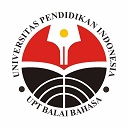MEANING ANALYSIS OF ISOGU, ASERU, AND AWATERU AS A SINONIM
Abstract
Keywords
Full Text:
FULLTEXT PDFReferences
Hirose, Masayoshi dan Shoji Kakuko. 1994. Nihongo Gakushuu Tsukaiwake Jiten. Tokyo: Kodansha.
Izuhara, Shouji, Tian, dan Jin Xiangshun. 1998. Ruigigo Tsukaiwake Jiten. Tokyo: Kenkyuusha Shuppan.
Japan Foundation. 2012. Nihongo Nouryoku Shiken N1. Jakarta: Japan Foundation.
Nabatame, Tomomi, Takahara Mari, dan Sunakawa Yuriko. 2017. Tagidoushi toshite no (Shiru) to (Wakaru) no Tsukaiwake: Koopasu o Katsuyou shita Ruigigo Bunseki. Kokuritsu Kokugo Kenkyuujo: Kokuritsu Kokugo Kenkyuujo Ronshuu.
Naitou, Yuko. 2006. Kenkyuu Nooto: “Awateru” no Tsukaikata to Shidouhou. Kansai Gaikokugo Daigaku Ryuugakusei Bekka: Nihongo Kyouiku Ronshuu.
Nukui, Tokuro. 2000. Shura no Owari. Tokyo: Kodansha.
Saputro, Muhammad Septian. 2016. Anaisis Makna Verba Kiru, Tatsu, dan Kizamu sebagai Sinonim. Skripsi Universitas Pendidikan Indonesia Jurusan Pendidikan Bahasa Jepang: Tidak diterbitkan.
Sono, Ayako. 1995. Akarukute Kanashii Basho. Tokyo:
Sutedi, Dedi. 2004. Dasar-dasar Linguistik bahasa Jepang. Bandung: Humaniora.
Sutedi, Dedi. 2011. Dasar-dasar Linguistik bahasa Jepang, Bandung: Humaniora.
Sutedi, Dedi. 2011. Penelitian Pendidikan bahasa Jepang, Bandung: Humaniora Utama Press dan UPI press.
Tadao, Umesao. 1995. Nihongo Dai Jiten Second Edition. Japan: Kodansha.
Tokugawa, Munemasa dan Miyajima Tatsuo. 1972. Ruigigo Jiten. Tokyo: Tokyodo Shuppan.
Situs internet:
Akebi Online Dictionary
ci.nii.ac.jp
http://dictionary.goo.ne.jp
http://ejje.weblio.jp
japanknowledge.com
Kamus Besar Bahasa Indonesia Online
Kotobank.jp
livedoor.com
tangorin.com
Tsukuba Web Corpus
www.lang-8.com
DOI: https://doi.org/10.17509/japanedu.v3i2.11823
Refbacks
- There are currently no refbacks.
Copyright (c) 2018 JAPANEDU: Jurnal Pendidikan dan Pengajaran Bahasa Jepang

This work is licensed under a Creative Commons Attribution-ShareAlike 4.0 International License.
 Published by:
Published by: Department of Japanese Language Education, Faculty of Language and Literature Education
Universitas Pendidikan Indonesia
 Online ISSN: Online ISSN:2528-5548 |

JAPANEDU: Jurnal Pendidikan dan Pengajaran Bahasa Jepang (e-ISSN:2528-5548) lisenced under a Creative Commons Attribution-ShareAlike 4.0 Internasional (CC BY-SA 4.0)

